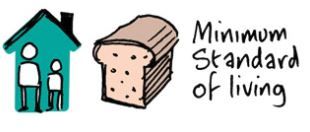The gap between Ireland’s minimum wage and the living wage has major implications for living standards

Ireland’s National Minimum Wage does not allow people to live what is considered a minimum socially acceptable standard of living in Ireland, and the planned increase in 2018 will not do much to change that. The high proportion of workers earning below the Living Wage is the focus of Issue 5 of the Employment Monitor.
The CSO’s most recent data on minimum wage employment shows that about 10 per cent of employees are working for the minimum wage or less. This is about twice the level of previous estimates, and there are tens of thousands of others working for a rate above the minimum wage but below the Living Wage.
According to the CSO, 13.3 per cent of people living in poverty and 24.8 per cent of people living in deprivation are in employment. This corresponds to more than 100,000 in poverty and almost 300,000 workers experiencing deprivation, despite having a job. This highlights the failure of policies which concentrate too heavily on job creation as a means of social progress.
Even after the indicated increase in the minimum wage coming next year, it will still be about 20 per cent below the Living Wage, which is the amount required for a minimum socially acceptable standard of living in Ireland.
This leads to unusually high numbers of people in employment who are still living in poverty, and casts doubt on the assumption that job creation should be the central focus of Ireland’s poverty relief strategy.
The Living Wage is currently €11.70 per hour, up 20 cents in the last 12 months.
Social Justice Ireland is seriously concerned about the gap between the minimum wage and the Living Wage. It means that there are hundreds of thousands of people at work who are unable to achieve a decent standard of living.
While the increasing number of jobs in Ireland is very welcome, many of the jobs being created are low-paid and are often precarious in nature. Job quality must now be a central focus for policymakers.
Government should also set out a plan to close the gap between the National Minimum Wage and the Living Wage, with a view to achieving parity between the two.
Other issues highlighted in the Employment Monitor include high levels of underemployment (or involuntary part-time employment), and the need for a sustained public investment programme.

GIVING A VOICE TO THOSE
WHO DON’T HAVE A VOICE
When you support Social Justice Ireland, you are tackling the causes of problems.
